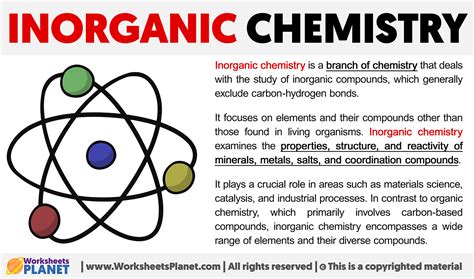Inorganic chemistry is the study of the properties and reactivity of inorganic compounds, which are compounds that do not contain carbon-hydrogen bonds. Inorganic compounds include metals, salts, minerals, and many other materials.

Inorganic chemistry is a vast and complex field, and it can be challenging to learn. However, it is also a fascinating and rewarding subject, and it can provide a solid foundation for a career in chemistry or a related field.
Here are some of the challenges that you may encounter when studying inorganic chemistry:
- The nomenclature of inorganic compounds can be complex. Inorganic compounds have a variety of names, and it can be difficult to remember which name corresponds to which compound.
- The structures of inorganic compounds can be complex. Inorganic compounds can have a variety of structures, and it can be difficult to visualize these structures in three dimensions.
- The reactions of inorganic compounds can be complex. Inorganic compounds can undergo a variety of reactions, and it can be difficult to predict the products of these reactions.
Despite these challenges, inorganic chemistry is a rewarding subject to study. Inorganic chemistry provides a deep understanding of the fundamental principles of chemistry, and it can help you to develop your problem-solving skills.
If you are interested in learning more about inorganic chemistry, here are some tips:
- Start by learning the basics. Before you can tackle the more complex topics in inorganic chemistry, you need to have a solid foundation in the basics. This includes topics such as the periodic table, chemical bonding, and stoichiometry.
- Use resources. There are a variety of resources available to help you learn inorganic chemistry. These resources include textbooks, websites, and online courses.
- Practice. The best way to learn inorganic chemistry is to practice. Try to solve problems and answer questions on a regular basis.
With hard work and dedication, you can succeed in inorganic chemistry.
Is Inorganic Chemistry Hard?
In a word, yes. Inorganic chemistry is widely considered to be one of the most challenging branches of chemistry. This is due to a number of factors, including:
- The sheer number of elements and compounds. There are over 100 elements in the periodic table, and each element can form a variety of compounds. This means that there are a vast number of inorganic compounds to learn about.
- The complex structures of inorganic compounds. Inorganic compounds can have very complex structures, which can make them difficult to understand and visualize.
- The reactivity of inorganic compounds. Inorganic compounds can be very reactive, which means that they can be dangerous to work with.
Common Mistakes to Avoid
When studying inorganic chemistry, it is important to avoid the following common mistakes:
- Memorizing facts without understanding the concepts. Inorganic chemistry is a conceptual subject, and it is important to understand the underlying concepts in order to succeed. Simply memorizing facts will not help you to do well in the long run.
- Getting bogged down in the details. Inorganic chemistry is a vast and complex subject, and it is easy to get bogged down in the details. It is important to focus on the big picture and to understand the overall concepts.
- Not practicing. The best way to learn inorganic chemistry is to practice. Try to solve problems and answer questions on a regular basis.
Tips and Tricks
Here are a few tips and tricks that can help you to succeed in inorganic chemistry:
- Use a periodic table. A periodic table is a valuable tool for studying inorganic chemistry. It can help you to identify the elements and compounds that you are working with.
- Draw Lewis structures. Lewis structures are a type of diagram that can help you to visualize the structure of inorganic compounds.
- Practice writing chemical equations. Chemical equations are a way of representing chemical reactions. Practicing writing chemical equations can help you to understand the reactions of inorganic compounds.
Pros and Cons of Inorganic Chemistry
Pros:
- Inorganic chemistry is a challenging subject, but it can also be very rewarding.
- Inorganic chemistry provides a deep understanding of the fundamental principles of chemistry.
- Inorganic chemistry can help you to develop your problem-solving skills.
Cons:
- Inorganic chemistry can be difficult to learn.
- Inorganic chemistry can be dangerous to work with.
- Inorganic chemistry is not as well-paying as some other branches of chemistry.
Conclusion
Inorganic chemistry is a challenging but rewarding subject. With hard work and dedication, you can succeed in inorganic chemistry.
